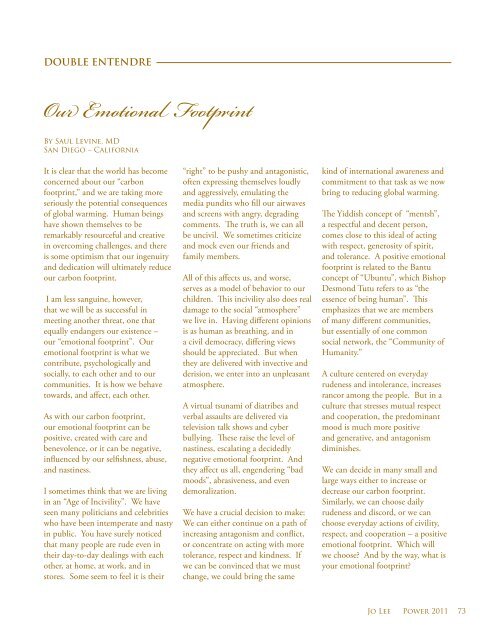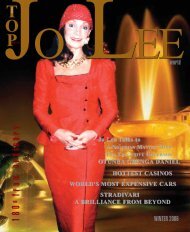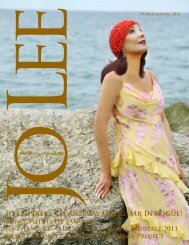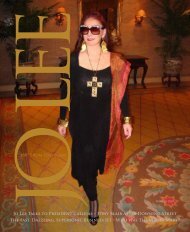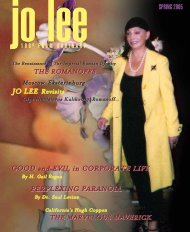Donna Saslove And Simon Lugassy - JO LEE Magazine
Donna Saslove And Simon Lugassy - JO LEE Magazine
Donna Saslove And Simon Lugassy - JO LEE Magazine
Create successful ePaper yourself
Turn your PDF publications into a flip-book with our unique Google optimized e-Paper software.
DOUBLE ENTENDRE<br />
Our Emotional Footprint<br />
By Saul Levine, MD<br />
San Diego – California<br />
It is clear that the world has become<br />
concerned about our “carbon<br />
footprint,” and we are taking more<br />
seriously the potential consequences<br />
of global warming. Human beings<br />
have shown themselves to be<br />
remarkably resourceful and creative<br />
in overcoming challenges, and there<br />
is some optimism that our ingenuity<br />
and dedication will ultimately reduce<br />
our carbon footprint.<br />
I am less sanguine, however,<br />
that we will be as successful in<br />
meeting another threat, one that<br />
equally endangers our existence –<br />
our “emotional footprint”. Our<br />
emotional footprint is what we<br />
contribute, psychologically and<br />
socially, to each other and to our<br />
communities. It is how we behave<br />
towards, and affect, each other.<br />
As with our carbon footprint,<br />
our emotional footprint can be<br />
positive, created with care and<br />
benevolence, or it can be negative,<br />
influenced by our selfishness, abuse,<br />
and nastiness.<br />
I sometimes think that we are living<br />
in an “Age of Incivility”. We have<br />
seen many politicians and celebrities<br />
who have been intemperate and nasty<br />
in public. You have surely noticed<br />
that many people are rude even in<br />
their day-to-day dealings with each<br />
other, at home, at work, and in<br />
stores. Some seem to feel it is their<br />
“right” to be pushy and antagonistic,<br />
often expressing themselves loudly<br />
and aggressively, emulating the<br />
media pundits who fill our airwaves<br />
and screens with angry, degrading<br />
comments. The truth is, we can all<br />
be uncivil. We sometimes criticize<br />
and mock even our friends and<br />
family members.<br />
All of this affects us, and worse,<br />
serves as a model of behavior to our<br />
children. This incivility also does real<br />
damage to the social “atmosphere”<br />
we live in. Having different opinions<br />
is as human as breathing, and in<br />
a civil democracy, differing views<br />
should be appreciated. But when<br />
they are delivered with invective and<br />
derision, we enter into an unpleasant<br />
atmosphere.<br />
A virtual tsunami of diatribes and<br />
verbal assaults are delivered via<br />
television talk shows and cyber<br />
bullying. These raise the level of<br />
nastiness, escalating a decidedly<br />
negative emotional footprint. <strong>And</strong><br />
they affect us all, engendering “bad<br />
moods”, abrasiveness, and even<br />
demoralization.<br />
We have a crucial decision to make:<br />
We can either continue on a path of<br />
increasing antagonism and conflict,<br />
or concentrate on acting with more<br />
tolerance, respect and kindness. If<br />
we can be convinced that we must<br />
change, we could bring the same<br />
kind of international awareness and<br />
commitment to that task as we now<br />
bring to reducing global warming.<br />
The Yiddish concept of “mentsh”,<br />
a respectful and decent person,<br />
comes close to this ideal of acting<br />
with respect, generosity of spirit,<br />
and tolerance. A positive emotional<br />
footprint is related to the Bantu<br />
concept of “Ubuntu”, which Bishop<br />
Desmond Tutu refers to as “the<br />
essence of being human”. This<br />
emphasizes that we are members<br />
of many different communities,<br />
but essentially of one common<br />
social network, the “Community of<br />
Humanity.”<br />
A culture centered on everyday<br />
rudeness and intolerance, increases<br />
rancor among the people. But in a<br />
culture that stresses mutual respect<br />
and cooperation, the predominant<br />
mood is much more positive<br />
and generative, and antagonism<br />
diminishes.<br />
We can decide in many small and<br />
large ways either to increase or<br />
decrease our carbon footprint.<br />
Similarly, we can choose daily<br />
rudeness and discord, or we can<br />
choose everyday actions of civility,<br />
respect, and cooperation – a positive<br />
emotional footprint. Which will<br />
we choose? <strong>And</strong> by the way, what is<br />
your emotional footprint?<br />
Jo Lee Power 2011 73


